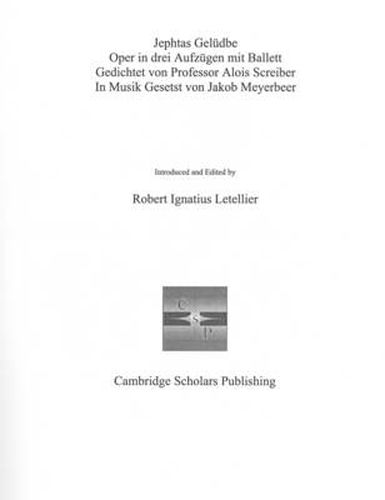Readings Newsletter
Become a Readings Member to make your shopping experience even easier.
Sign in or sign up for free!
You’re not far away from qualifying for FREE standard shipping within Australia
You’ve qualified for FREE standard shipping within Australia
The cart is loading…






Meyerbeer’s first opera, Jephtas Gelubde, has a libretto by the German academic Alois Schreiber, based on a Biblical theme taken from chapters 11-12 of the Book of Judges.
The conflict between paternal love and love of country intrinsic to this scenario was also chosen by Meyerbeer as the basic theme of his opera, and is reflected in the overture, a symphonic anticipation of the essential features of the action.
The opera, whose final rehearsals were conducted by the composer in person, was admirably produced by the Munich Court Opera on 23 December 1812, but on account of its novelty met with indifference, so that it was withdrawn. A newspaper report did, however, observe: A delicate sensibility, united to a profound and mature insight into the workings of the impassioned human heart, is manifested throughout in a grand and elevated style that gives promise of something great in the future. This score contains the seeds of the whole of Meyerbeer’s future development. It is impossible to conceive of Meyerbeer’s progress to mastership without the Jephta score. Meyerbeer was responding to the heritage of his predecessors-the Handel of the oratorios (in the depiction of grandiose biblical drama), and the Gluck of the tragedie lyrique (in the depth of both public and private emotional exploration), but also alert to issues in contemporary opera, like the Rescus Motif and development of the villain. There is also evidence of Meyerbeer’s famed orchestral virtuosity and imagination already at work. In his psychological exploration, Meyerbeer already begins to use thematic tagging and forshadowing most imaginatively, and points the way far beyond Gluck, in the direction of Weber-Wagner.
$9.00 standard shipping within Australia
FREE standard shipping within Australia for orders over $100.00
Express & International shipping calculated at checkout
Meyerbeer’s first opera, Jephtas Gelubde, has a libretto by the German academic Alois Schreiber, based on a Biblical theme taken from chapters 11-12 of the Book of Judges.
The conflict between paternal love and love of country intrinsic to this scenario was also chosen by Meyerbeer as the basic theme of his opera, and is reflected in the overture, a symphonic anticipation of the essential features of the action.
The opera, whose final rehearsals were conducted by the composer in person, was admirably produced by the Munich Court Opera on 23 December 1812, but on account of its novelty met with indifference, so that it was withdrawn. A newspaper report did, however, observe: A delicate sensibility, united to a profound and mature insight into the workings of the impassioned human heart, is manifested throughout in a grand and elevated style that gives promise of something great in the future. This score contains the seeds of the whole of Meyerbeer’s future development. It is impossible to conceive of Meyerbeer’s progress to mastership without the Jephta score. Meyerbeer was responding to the heritage of his predecessors-the Handel of the oratorios (in the depiction of grandiose biblical drama), and the Gluck of the tragedie lyrique (in the depth of both public and private emotional exploration), but also alert to issues in contemporary opera, like the Rescus Motif and development of the villain. There is also evidence of Meyerbeer’s famed orchestral virtuosity and imagination already at work. In his psychological exploration, Meyerbeer already begins to use thematic tagging and forshadowing most imaginatively, and points the way far beyond Gluck, in the direction of Weber-Wagner.